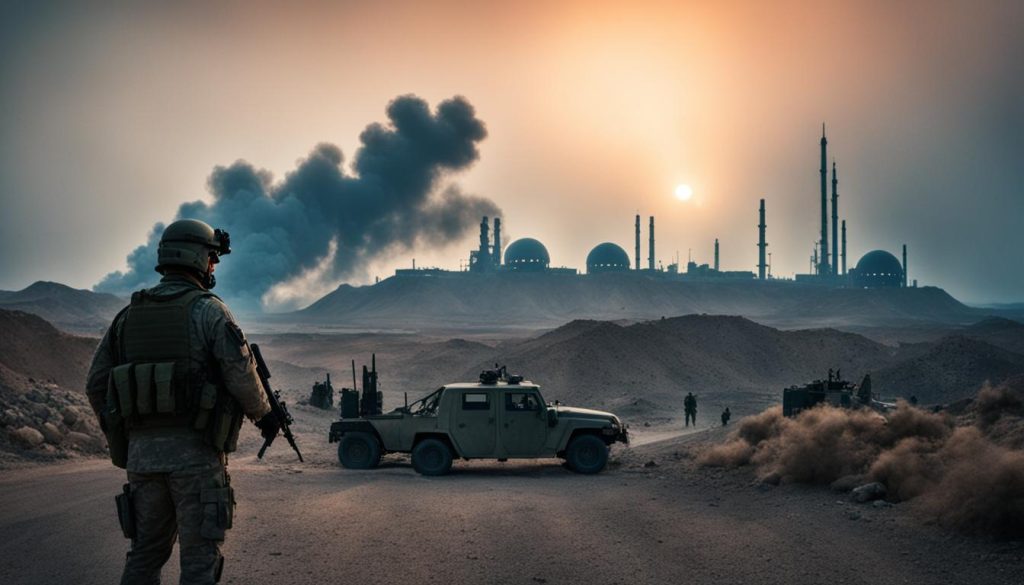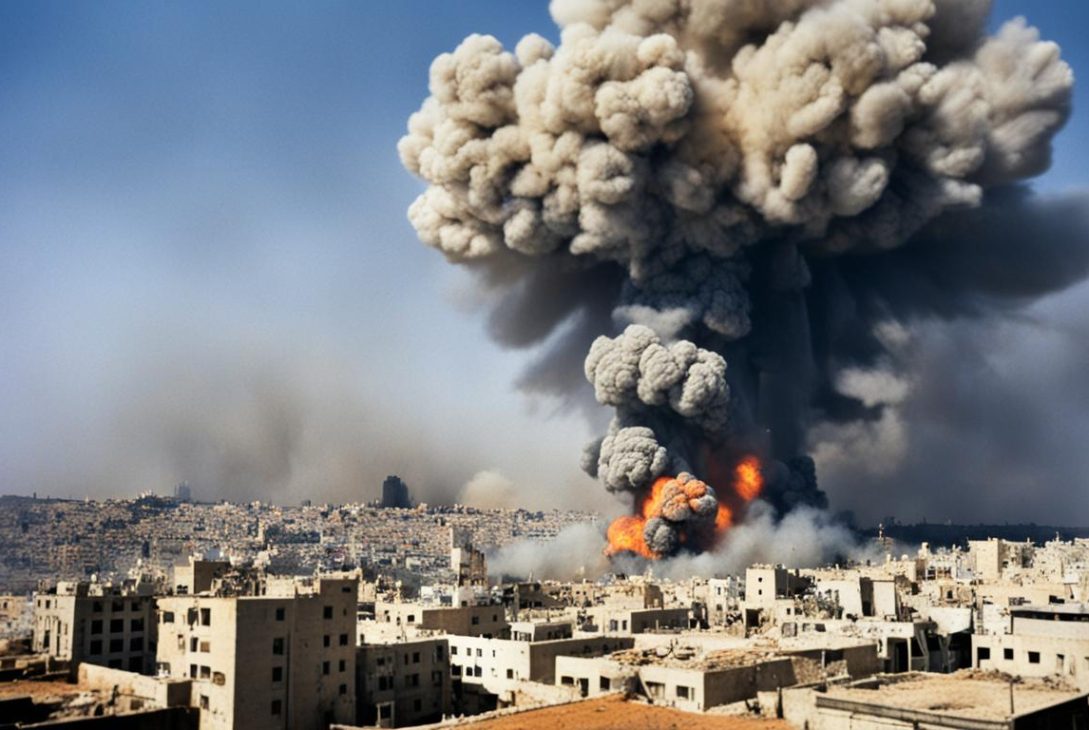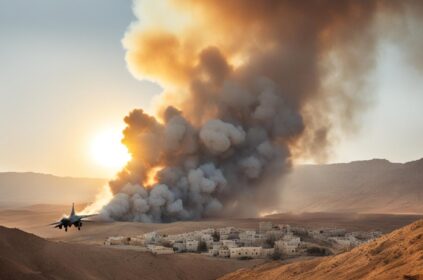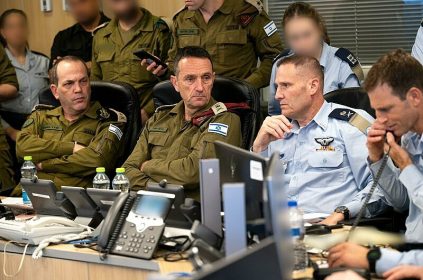Tensions in the Middle East have reached a boiling point as Israel launches a series of attacks on Iran, further fueling the conflict that has plagued the region for years. The implications of these actions extend beyond the borders of the two nations, sparking concerns about regional security and global relations. The ongoing hostilities between Israel and Iran have far-reaching consequences that require immediate attention and resolution.
The conflict in the Middle East has long been a major source of instability in the region, with deep-rooted political, religious, and territorial disputes. Israel’s attacks on Iran have exacerbated these tensions, pushing the delicate balance of power to the brink. As both nations engage in a war of words and military actions, the risk of escalation and spillover effects looms large.
Key Takeaways:
- The recent escalation between Israel and Iran has heightened regional tensions and raised concerns about global relations.
- The conflict in the Middle East poses significant challenges to regional security and stability.
- Both Israel and Iran’s actions have sparked international debates over the appropriate response and potential consequences.
- Diplomatic and political solutions are essential in de-escalating the situation and preventing further deterioration.
- The ongoing conflict emphasizes the need for international cooperation and collective efforts towards finding a peaceful resolution.
Israeli Allegations Against Iran
Israel’s UN ambassador has made serious allegations against Iran, accusing the country of seeking world domination. Presenting evidence of intercepted Iranian drones above Jerusalem’s Al-Aqsa Mosque, Israel’s UN ambassador has urged the UN Security Council to take immediate action. In particular, he has called for the designation of the Iranian Revolutionary Guard Corps (IRGC) as a terror organization.
“Iran’s ambitions for world domination pose a grave threat to regional security and global stability. The interception of Iranian drones above Jerusalem’s Al-Aqsa Mosque is a clear example of Iran’s aggressive actions. It is imperative that the UN Security Council recognizes the dangerous nature of the Iranian Revolutionary Guard Corps and addresses this issue with the urgency it demands,” said Israel’s UN ambassador.
Israel’s allegations stem from their concern over Iran’s increasing influence and assertiveness in the Middle East. The Israeli government believes that designating the IRGC as a terror organization will help curb Iran’s destabilizing activities and prevent further aggression in the region.
To support their claims, Israel has provided evidence including the intercepted drones and intelligence on IRGC’s involvement in proxy conflicts across the Middle East. The Israeli government argues that by designating the IRGC as a terror organization, the international community can send a strong message to Iran and hold them accountable for their actions.
| Allegation | Evidence |
|---|---|
| Iran seeks world domination | Intercepted Iranian drones above Jerusalem’s Al-Aqsa Mosque |
| IRGC involvement in proxy conflicts | Intelligence reports and analysis |
The Israeli government’s push for the UN Security Council to take action against Iran reflects their deep concern for regional stability. They believe that through a united international effort, Iran’s aggressive actions can be deterred, and the safety of Israel and the Middle East can be preserved.
Iran’s Defense Justification
Iran’s UN ambassador has staunchly defended the recent attack, citing Iran’s inherent right to self-defense under Article 51 of the UN Charter and international law. The ambassador emphasized that the operation was strategically planned and executed with precision, targeting only military objectives and aiming to prevent further escalation and civilian harm.
“Our actions were fully justified under international law. We were exercising our legitimate right to defend ourselves and protect our national security,”
The ambassador further highlighted that the attack adhered to the principles of proportionality and necessity, ensuring that its objectives were in line with the permissible use of force in self-defense. By targeting specific military objectives, Iran aimed to limit the potential for collateral damage and civilian casualties.
This defense is rooted in Article 51, which recognizes the inherent right of nations to defend themselves against armed attacks. Iran argues that its recent offensive was a direct response to imminent threats and was in line with the requirements of international law.
Iran’s defense justification raises important questions about the interpretation and application of international law in cases of self-defense. While acknowledging the seriousness of the situation and the complexity of the ongoing conflict between Iran and Israel, understanding the legal justifications behind these actions is crucial in assessing the broader regional and global implications.
A Comparison of Iran’s Defense Justification and International Law
| Iran’s Defense Justification | International Law |
|---|---|
| Exercising inherent right to self-defense | Recognized under Article 51 of UN Charter |
| Operation targeted only military objectives | Use of force in self-defense should be proportionate and limited to military objectives |
| Aimed to prevent further escalation and civilian harm | Consideration of necessity and proportionality in the use of force |
This table highlights the alignment between Iran’s defense justification and key principles of international law. It emphasizes the importance of assessing the legality and legitimacy of military actions within the framework of international legal standards.
Anticipation of Tehran’s Attack
Amid escalating tensions between Israel and Iran, anticipation grew following a suspected Israeli strike on an Iranian diplomatic complex in Syria. This incident heightened the possibility of an anticipated attack and set the stage for further actions by both countries.
“The suspected Israeli strike on the Iranian diplomatic complex in Syria has raised concerns and sparked a sense of urgency within the international community. The potential ramifications of this incident on regional stability and global security cannot be underestimated,” said a UN spokesperson.
This targeted strike on the Iranian diplomatic complex, believed to be carried out by Israel, served as a catalyst for heightened tensions between the two nations. The attack further fueled Iran’s determination to respond and defend its interests in the region.
The suspected Israeli strike on the Iranian diplomatic complex in Syria not only damaged the facility but also acted as a clear message from Israel to Iran, signaling its intentions and asserting its stance on regional security.
As these events unfolded, analysts and experts closely monitored the situation, diligently assessing the potential consequences of Tehran’s anticipated attack in response to the Israeli strike. The delicate balance of power in the Middle East became increasingly fragile, raising concerns of a wider conflict.
| Israeli Strike Targets | Suspected Outcomes |
|---|---|
| Iranian Diplomatic Complex | Possible retaliation targeting Israeli diplomatic missions abroad |
| Strategic Military Infrastructure | Increased attacks on Israeli military bases located near Iran’s borders |
| Key Regional Allies | Escalation in proxy conflicts, particularly in Syria, Lebanon, and Yemen |
Analysis of Anticipated Attack Scenarios
- If Iran chooses to retaliate by targeting Israeli diplomatic missions abroad, it could provoke a further cycle of violence, leading to substantial diplomatic, economic, and political consequences for both countries.
- A direct assault on strategic military infrastructure, such as Israeli military bases near Iran’s borders, has the potential to escalate the conflict, triggering a wider regional war and threatening the stability of neighboring countries.
- An increase in proxy conflicts, particularly in Syria, Lebanon, and Yemen, could result in a greater degree of involvement from regional and international actors, amplifying the risks and intensity of the conflict.
As the world closely watches the situation unfold, diplomatic efforts to de-escalate tensions and find a peaceful resolution remain crucial. The anticipated attack from Tehran has highlighted the urgent need for international cooperation and diplomatic initiatives to avoid further escalation and promote regional stability.
Iran’s Warning to the US
Amid escalating tensions in the Middle East, Iran’s UN ambassador has issued a stern warning to the United States. While Iran emphasizes its lack of intention to engage in conflict with the US within the region, it asserts its inherent right to respond proportionately in the face of a US-initiated military operation targeting Iranian citizens or security.
Iran’s UN ambassador’s warning reflects the country’s commitment to preserving regional security and protecting its people. The ambassador emphasizes that any military action by the US would elicit a legitimate response from Iran, in line with international norms and the principles of self-defense.
“Iran has consistently reiterated its aversion to conflict with the United States. However, should the US embark on a military operation against Iran or undermine the security of our nation or citizens, Iran will exercise its inherent right to retaliate proportionately.”
Iran’s warning serves as a reminder of the delicate balance in the region and the potential consequences of military escalations. It emphasizes the need for all parties involved to exercise restraint, prioritize diplomatic solutions, and uphold international law.
The ongoing tensions between Iran and the US highlight the intricate geopolitical landscape in the Middle East and the potential for wider ramifications. Proportional responses aligned with international norms and the avoidance of further conflict are essential to prevent a further deterioration of the situation.
Key Points:
- Iran warns the US against initiating a military operation targeting Iranian citizens or security.
- Iran asserts its inherent right to respond proportionately to any US military aggression.
- The warning emphasizes the importance of preserving regional security and protecting Iranian interests.
- Diplomatic solutions and adherence to international law are crucial for mitigating tensions in the region.
Comparison of Iranian and US Military Capabilities
| Iran | United States | |
|---|---|---|
| Nuclear Arsenal | Limited | Largest in the world |
| Missile Systems | Diverse range with regional reach | Advanced and extensive capabilities |
| Regional Influence | Significant in Iraq, Syria, and Lebanon | Extensive reach and global alliances |
| Military Budget | Moderate in comparison | Largest military expenditure worldwide |
Regional and International Implications
The escalating tensions between Israel and Iran have far-reaching consequences for the entire Middle East region and global relations. The conflict raises concerns about the potential for a regional war and heightened geopolitical tensions, which could have significant implications for stability and security.
The regional implications of the Israel-Iran conflict are extensive. The Middle East region, which is already grappling with numerous political and security challenges, faces the risk of further instability and violence. The conflict has the potential to spark a wider regional war, drawing in neighboring countries and exacerbating existing conflicts.
The global consequences of the Israel-Iran conflict cannot be understated. The political stability of the Middle East holds immense importance for the international community, given the region’s strategic significance and vast energy resources. Heightened geopolitical tensions resulting from the escalating conflict could have a ripple effect on global politics and trade.
“The tensions between Israel and Iran are a cause for concern among the international community. The risk of spillover effects, such as increased political instability and military intervention, cannot be ignored.”
The heightened geopolitical tensions between Israel and Iran raise questions about the stability of existing regional alliances and relationships. The conflict has the potential to strain diplomatic ties and reshape alliances as countries align themselves with either Israel or Iran. Furthermore, the conflict creates fertile ground for the proliferation of proxy conflicts, as regional powers seize the opportunity to advance their own interests.
It is essential for the international community to closely monitor and engage in dialogue with all parties involved in the Israel-Iran conflict. Diplomatic efforts, de-escalation measures, and international cooperation are crucial in mitigating the risk of a regional war and working towards finding a peaceful resolution.
| Regional Implications | Global Consequences | Heightened Geopolitical Tensions |
|---|---|---|
| Increased political instability | Impact on global politics and trade | Strained diplomatic ties |
| Potential for wider regional war | Ripple effect on global relations | Reshaping of regional alliances |
| Risk of military intervention | Security implications for the Middle East | Proliferation of proxy conflicts |
Nuclear Threat and Security
The ongoing conflict between Israel and Iran poses a significant nuclear threat in the region, amplifying concerns about regional security. The escalating tensions between these two countries have raised alarms within the international community, underscoring the urgent need for diplomatic and non-proliferation efforts.
The United Nations Security Council plays a crucial role in addressing the nuclear threat and ensuring regional security. As the primary international body responsible for maintaining peace and security, the UN Security Council has the authority to enforce resolutions and impose sanctions on nations that violate non-proliferation agreements.
Non-proliferation efforts are vital in preventing the spread of nuclear weapons and technology. The UN Security Council, supported by various international treaties and agreements, works toward limiting the acquisition and development of nuclear weapons by nations, promoting disarmament, and encouraging peaceful uses of nuclear energy.
“The stakes are high when it comes to regional security and the nuclear threat. It is imperative for all countries, especially those involved in conflicts, to adhere to international non-proliferation agreements and engage in constructive dialogue to de-escalate tensions.”
Regional Cooperation and Confidence-Building Measures
Regional cooperation and confidence-building measures are essential in promoting stability and reducing the nuclear threat. By fostering constructive dialogue and engagement, countries in the Middle East can build trust, address security concerns, and work towards peaceful resolutions.
The establishment of nuclear-weapon-free zones, such as the Treaty on the Non-Proliferation of Nuclear Weapons (NPT), can contribute to regional security and diminish the risk of nuclear escalation. These zones prohibit the deployment, testing, and acquisition of nuclear weapons within specific geographical areas, fostering peace and stability.
Furthermore, regional organizations and initiatives, such as the Arab League and the Gulf Cooperation Council (GCC), play significant roles in promoting nuclear non-proliferation and regional security. Through these organizations, countries in the region can collaborate, share information, and develop joint strategies to address the nuclear threat collectively.
International Support and Cooperation
International support and cooperation are crucial in addressing the nuclear threat and enhancing regional security. Multilateral diplomatic efforts, led by the UN Security Council, aim to ensure compliance with non-proliferation agreements and promote dialogue to resolve conflicts peacefully.
Key global powers, including the United States, Russia, China, and the European Union, possess significant influence and leverage in mitigating the nuclear threat. Their active engagement in diplomatic negotiations and commitment to non-proliferation efforts strengthen the international community’s position in addressing regional security concerns.

Political and Diplomatic Solutions
The escalation between Israel and Iran calls for immediate attention and the exploration of political and diplomatic solutions. It is crucial to find a pathway towards de-escalation and resolve the conflict through diplomatic negotiations and international cooperation.
The complexity of the situation requires a thoughtful and strategic approach to address the underlying issues. Political solutions can provide a framework for resolving disagreements and building a foundation for peace in the region.
Diplomatic negotiations play a vital role in facilitating dialogue between the involved parties. Engaging in constructive discussions allows for a better understanding of each other’s perspectives and concerns. It is through these negotiations that compromises can be sought and agreements can be reached.
Political solutions, diplomatic negotiations, and international cooperation are essential in resolving the conflict and maintaining stability in the region.
International cooperation is crucial in addressing the broader implications and consequences of the conflict. By involving regional and international stakeholders, a collective effort can be made to find a peaceful resolution and prevent further escalation.
Recognizing the importance of political and diplomatic solutions is key to mitigating tensions and fostering dialogue. It is through these avenues that sustainable peace and stability can be achieved, ensuring the well-being of the region and its people.
Examples of Political and Diplomatic Solutions
| Political Solution | Description |
|---|---|
| Ceasefire Agreement | An agreement between the involved parties to halt military operations and engage in diplomatic negotiations. |
| Mediation by International Organizations | Engagement of neutral third parties or international organizations to facilitate dialogue and negotiations between the countries. |
| Dialogue and Confidence-Building Measures | Routine meetings and discussions to improve communication, build trust, and find common ground. |
| Creation of Diplomatic Channels | Establishment of channels of communication between diplomatic representatives of the countries to foster dialogue and understanding. |
These are just a few examples of the political and diplomatic solutions that can contribute to the resolution of conflicts. Implementing these measures requires commitment, good faith, and the willingness to work towards a peaceful resolution.
Political solutions, diplomatic negotiations, de-escalation, and international cooperation must remain at the forefront of efforts to address the ongoing conflict between Israel and Iran. Only through a joint and determined approach can the path towards peace and stability in the region be paved.
Impacts on Middle East Stability
The ongoing tensions between Israel and Iran have significant impacts on the overall stability of the Middle East. The region, already plagued by conflicts and political unrest, is further destabilized by the escalating hostilities between these two regional powers. The repercussions of this conflict extend beyond the borders of the nations involved, affecting the balance of power and regional alliances.
The Middle East stability is intricately connected to the relationships between countries in the region. As tensions rise between Israel and Iran, other countries are forced to take sides and align themselves with one party or the other. These regional alliances can have far-reaching consequences, amplifying the existing geopolitical tensions and potential for further conflict.
One of the key concerns arising from the conflict between Israel and Iran is the proliferation of proxy conflicts throughout the Middle East. Proxy conflicts occur when external powers support opposing factions within a particular country, using them as surrogates to advance their own geopolitical interests. The ongoing tensions between Israel and Iran provide fertile ground for such proxy conflicts to emerge, exacerbating existing conflicts in countries like Syria, Lebanon, and Yemen.
The Middle East stability is at a critical juncture, with the potential for a domino effect of proxy wars and regional alliances being reshaped.
The consequences of these proxy conflicts are manifold. They inflict immense human suffering and exacerbate the already dire humanitarian situations in war-torn regions. Moreover, they prolong the conflicts, making it increasingly challenging to find peaceful resolutions. The proxy conflicts also complicate efforts from the international community to mediate and negotiate lasting peace agreements.
To illustrate the impacts on Middle East stability, the following table provides a snapshot of regional alliances and ongoing proxy conflicts:
| Country | Alliances | Proxy Conflicts |
|---|---|---|
| Lebanon | Hezbollah (supported by Iran) | Hezbollah involvement in the Syrian conflict |
| Syria | Russia (supports Syrian government) | Iran’s support for Syrian government against rebel forces |
| Yemen | Saudi Arabia (supported by the US) | Houthi rebels (supported by Iran) |
This table highlights some of the key actors and alliances in the Middle East, as well as the proxy conflicts that have emerged or intensified due to the tensions between Israel and Iran. It demonstrates the complex dynamics and interconnectedness of regional alliances and conflicts in the region.
The image above illustrates the interplay between Middle East stability, regional alliances, and proxy conflicts. It serves as a visual representation of the complex relationships and the potential ripple effects of the ongoing tensions in the region.
Conclusion
The conflict between Israel and Iran has intensified regional tensions in the Middle East and has significant global implications. The recent events have highlighted the complex dynamics at play and the need for diplomatic solutions and de-escalation to prevent further deterioration of the situation.
The allegations made by Israel against Iran and Iran’s defense justification reveal the deep-rooted mistrust and differing perspectives between the two nations. These factors, combined with the warnings of potential military operations, have raised concerns for regional security and stability.
To mitigate the risk of a full-blown regional war and the spillover effects on global relations, international cooperation and diplomatic negotiations are essential. It is crucial for the international community to engage in constructive dialogue and find peaceful resolutions to prevent further escalation and promote lasting peace in the Middle East.
FAQ
What were Israel’s allegations against Iran?
How did Iran justify its attack on Israel?
Why was Iran’s attack on Israel anticipated?
What warning did Iran issue to the US?
What are the regional and international implications of the Israel-Iran conflict?
How does the Israel-Iran conflict contribute to the nuclear threat and regional security?
What are the political and diplomatic solutions to the Israel-Iran conflict?
How does the Israel-Iran conflict impact the stability of the Middle East?
Source Links
Foreign Relations Geopolitical Strife Israel-Iran Conflict Middle East tensions Military Aggression Nuclear Threat Regional Instability
Last modified: April 19, 2024







